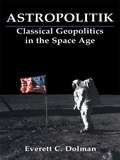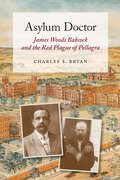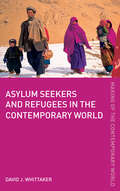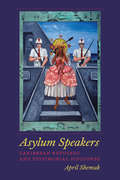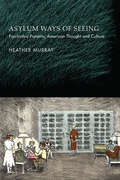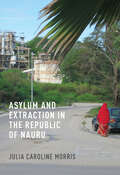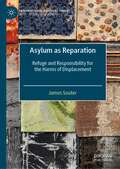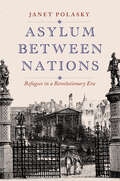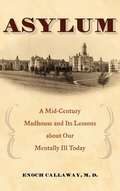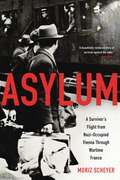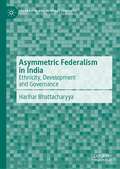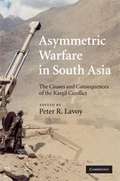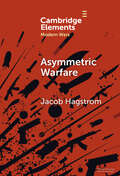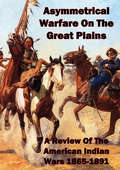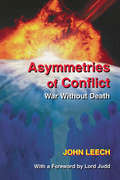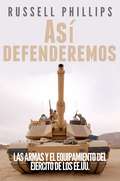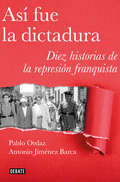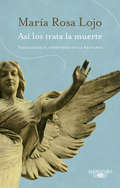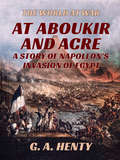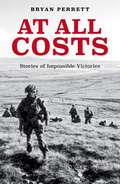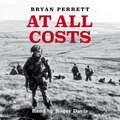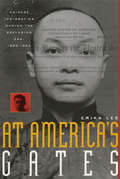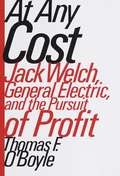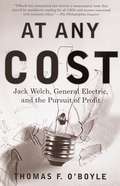- Table View
- List View
Astropolitik: Classical Geopolitics in the Space Age (Strategy and History)
by Everett C. DolmanThis volume identifies and evaluates the relationship between outer-space geography and geographic position (astrogeography), and the evolution of current and future military space strategy. In doing so, it explores five primary propositions.
Asylum Doctor: James Woods Babcock and the Red Plague of Pellagra
by Charles S. BryanThis biography of an early twentieth-century South Carolina doctor sheds light on his pioneering work with the mentally ill to combat a public health scourge.Thousands of Americans died of pellagra before the cause—vitamin B3 deficiency—was identified. Credit for solving the mystery is usually given to Dr. Joseph Goldberger of the US Public Health Service. But in Asylum Doctor, Charles S. Bryan demonstrates that a coalition of American asylum superintendents, local health officials, and practicing physicians set the stage for Golberger’s historic work—chief among them was Dr. James Woods Babcock.As superintendent of the South Carolina State Hospital for the Insane from 1891 to 1914, Babcock sounded the alarm against pellagra. He brough out the first English-language treatise on the subject and organized the National Association for the Study of Pellagra. He did so in the face of troubled asylum governance which, coupled with Governor Cole Blease’s political intimidation and unblushing racism, eventually drove Babcock from his post. Asylum Doctor describes the plight of the mentally ill in South Carolina during an era when public asylums had devolved into convenient places to warehouse inconvenient people. It is the story of an idealistic humanitarian who faced conditions most people would find intolerable. And it is important social history for, as this book’s epigraph puts it, “in many ways the Old South died with the passing of pellagra.”
Asylum Seekers and Refugees in the Contemporary World (The Making of the Contemporary World)
by David J. WhittakerExamining a number of case studies, including Palestinian, Afghan and Iraqi refugees, David J. Whittaker’s book provides a balanced introduction to this very controversial subject. Fuelled by extensive coverage in the media, the issue of asylum seekers and refugees is one of the most talked about subjects in contemporary politics. Whittaker cuts through the emotive language to give an objective introduction to the subject. Asylum Seekers and Refugees in the Contemporary World discusses the international as well as national implications of the issue, and the book looks in detail at the issue as it has affected Britain and Europe in particular, as well as including material on the UN and its response to the refugee ‘problem’. Including a final statement on the British government’s 2005 proposals for dealing with refugees, this volume is essential reading for all students of the history of the modern world and is ideal for newcomers to the subject.
Asylum Speakers: Caribbean Refugees and Testimonial Discourse
by April ShemakOffering the first interdisciplinary study of refugees in the Caribbean, Central America, and the United States, Asylum Speakers relates current theoretical debates about hospitality and cosmopolitanism to the actual conditions of refugees. In doing so, the author weighs the questions of "truth value" associated with various modes of witnessing to explore the function of testimonial discourse in constructing refugee subjectivity in New World cultural and political formations. By examining literary works by such writers as Edwidge Danticat, Nikòl Payen, Kamau Brathwaite, Francisco Goldman, Julia Alvarez, Ivonne Lamazares, and Cecilia Rodríguez Milanés, theoretical work by Jacques Derrida, Edouard Glissant, and Wilson Harris, as well as human rights documents, government documents, photography, and historical studies, Asylum Speakers constructs a complex picture of New World refugees that expands current discussions of diaspora and migration, demonstrating that the peripheral nature of refugee testimonial narratives requires us to reshape the boundaries of U.S. ethnic and postcolonial studies.
Asylum Ways of Seeing: Psychiatric Patients, American Thought and Culture
by Heather MurrayAsylum Ways of Seeing is a cultural and intellectual history of people with mental illnesses in the twentieth-century United States. While acknowledging the fraught, and often violent, histories of American psychiatric hospitals, Heather Murray also suggests that it is in these hospitals that patients became more intense observers: they gave more conscious consideration to institutional and broader kinds of citizenship, to the nature and needs of communities versus those of individuals, to scientific modernity, and to human rights and solidarities among the suffering. All of these ideas have animated twentieth-century America, and, as Murray shows, have not just flowed into psychiatric hospitals but outward from them as well. These themes are especially clear within patients' intimate, creative, and political correspondence, writings, and drawings, as well as in hospital publications and films.This way of thinking and imagining contrasts with more common images of the patient—as passive, resigned, and absented from the world in the cloistered setting of the hospital—that have animated psychiatry over the course of the twentieth century. Asylum Ways of Seeing traces how it is that patient resignation went from being interpreted as wisdom in the early twentieth century, to being understood as a capitulation in scientific and political sources by mid-century, to being seen as a profound violation of selfhood and individual rights by the century's end. In so doing, it makes a call to reconsider the philosophical possibilities within resignation.
Asylum and Extraction in the Republic of Nauru
by Julia Caroline MorrisAsylum and Extraction in the Republic of Nauru provides an extraordinary glimpse into the remote and difficult-to-access island of Nauru, exploring the realities of Nauru's offshore asylum arrangement and its impact on islanders, workforces, and migrant populations. Drawing on extensive fieldwork in Nauru, Australia, and Geneva, as well as a deep dive into the British Phosphate Commission archives, Julia Caroline Morris charts the island's colonial connection to phosphate through to a new industrial sector in asylum. She explores how this extractive industry is peopled by an ever-shifting cast of refugee lawyers, social workers, clinicians, policy makers, and academics globally and how the very structures of Nauru's colonial phosphate industry and the legacy of the "phosphateer" era made it easy for a new human extractive sector to take root on the island. By detailing the making of and social life of Nauru's asylum system, Morris shows the institutional fabric, discourses, and rhetoric that inform the governance of migration around the world. As similar practices of offshoring and outsourcing asylum have become popular worldwide, they are enabled by the mobile labor and expertise of transnational refugee industry workers who carry out the necessary daily operations. Asylum and Extraction in the Republic of Nauru goes behind the scenes to shed light on the everyday running of the offshore asylum industry in Nauru and uncover what really happens underneath the headlines. Morris illuminates how refugee rights activism and #RefugeesWelcome-style movements are caught up in the hardening of border enforcement operations worldwide, calling for freedom of movement that goes beyond adjudicating hierarchies of suffering.
Asylum as Reparation: Refuge and Responsibility for the Harms of Displacement (International Political Theory)
by James SouterThis book argues that states have a special obligation to offer asylum as a form of reparation to refugees for whose flight they are responsible. It shows the great relevance of reparative justice, and the importance of the causes of contemporary forced migration, for our understanding of states’ responsibilities to refugees. Part I explains how this view presents an alternative to the dominant humanitarian approach to asylum in political theory and some practice. Part II outlines the conditions under which asylum should act as a form of reparation, arguing that a state owes this form of asylum to refugees where it bears responsibility for the unjustified harms that they experience, and where asylum is the most fitting form of reparation available. Part III explores some of the ethical implications of this reparative approach to asylum for the workings of states’ asylum systems and the international politics of refugee protection.
Asylum between Nations: Refugees in a Revolutionary Era
by Janet PolaskyWhy some of the most vulnerable communities in Europe, from independent cities to new monarchies, welcomed refugees during the Age of Revolutions and prospered &“Janet Polasky unearths an unappreciated history of the experience of asylum in Europe and the United States since the Age of the Democratic Revolutions. Facing squarely the destruction of asylum in our own time, she ends with a stunningly optimistic vision of a path toward its reconstruction.&”—Linda K. Kerber, author of No Constitutional Right to Be Ladies Driven from their homelands, refugees from ancient times to the present have sought asylum in worlds turned upside down. Theirs is an age‑old story. So too are the solutions to their plight. In the wake of the American and French Revolutions, thousands of men and women took to the roads and waterways on both sides of the Atlantic—refugees in search of their inalienable rights. Although larger nations fortified their borders and circumscribed citizenship, two port cities, German Hamburg and Danish Altona, opened their doors, as did the federated Swiss cantons and the newly independent Belgian monarchy. The refugees thrived and the societies that harbored them prospered. The United States followed, not only welcoming waves of immigrants in the mid‑nineteenth century but offering them citizenship as well. In this remarkable story of the first modern refugee crisis, historian Janet Polasky shows how open doors can be a viable alternative to the building of border walls.
Asylum: A Mid-Century Madhouse and Its Lessons about Our Mentally ill Today
by Enoch CallawayIn his witty and warm history of the facility founded in 1833, Callaway reflects not just on the events in this fortress-like place, but also how those events parallel advances and failures in the field of psychiatry itself.
Asylum: A Survivor's Flight from Nazi-Occupied Vienna Through Wartime France
by P. N. Singer Moriz ScheyerA recently discovered account of an Austrian Jewish writer's flight, persecution, and clandestine life in wartime France.As arts editor for one of Vienna's principal newspapers, Moriz Scheyer knew many of the city's foremost artists, and was an important literary journalist. With the advent of the Nazis he was forced from both job and home. In 1943, in hiding in France, Scheyer began drafting what was to become this book. Tracing events from the Anschluss in Vienna, through life in Paris and unoccupied France, including a period in a French concentration camp, contact with the Resistance, and clandestine life in a convent caring for mentally disabled women, he gives an extraordinarily vivid account of the events and experience of persecution. After Scheyer's death in 1949, his stepson, disliking the book's anti-German rhetoric, destroyed the manuscript. Or thought he did. Recently, a carbon copy was found in the family's attic by P.N. Singer, Scheyer's step-grandson, who has translated and provided an epilogue.
Asymmetric Federalism in India: Ethnicity, Development and Governance (Federalism and Internal Conflicts)
by Harihar BhattacharyyaThis book provides a critical account of federal asymmetry in India - its origins, context, forms and functioning - by taking into account the institutional effectiveness of asymmetric institutions in the regions for identity fulfillment, development and governance. It argues that while some asymmetry, de jure/ or de facto, is part of all federations for meeting some special circumstances, in India, which has followed a different path of federation building, asymmetric institutional solutions especially in the border areas have played a crucially important role in accommodating ethno-cultural diversity, ensuring law and order, a level of development and governance in a process that has turned the ‘rebels into stakeholders’. India’s federal asymmetric designs and their working has been a key to holding the peripheries within the Union of India. The book utilizes both archival research and empirical survey data, as well as elite interviews.
Asymmetric Warfare in South Asia: The Causes and Consequences of the Kargil Conflict
by Peter R. LavoyThe 1999 conflict between India and Pakistan near the town of Kargil in contested Kashmir was the first military clash between two nuclear-armed powers since the 1969 Sino-Soviet war. Kargil was a landmark event not because of its duration or casualties, but because it contained a very real risk of nuclear escalation. Until the Kargil conflict, academic and policy debates over nuclear deterrence and proliferation occurred largely on the theoretical level. This deep analysis of the conflict offers scholars and policymakers a rare account of how nuclear-armed states interact during military crisis. Written by analysts from India, Pakistan, and the United States, this unique book draws extensively on primary sources, including unprecedented access to Indian, Pakistani, and U. S. government officials and military officers who were actively involved in the conflict. This is the first rigorous and objective account of the causes, conduct, and consequences of the Kargil conflict.
Asymmetric Warfare: Politics and Cultures of Violence in the Modern Era (Elements in Modern Wars)
by Jacob HagstromThe forces that fight asymmetric wars are so distinct that one side avoids direct military confrontation in favor of political, social, or otherwise unorthodox means of resistance. These conflicts have been a mainstay of modern times, though scholars have often separated them into various designations by era. Observers have referred, in chronological order, to Indian warfare, petite guerre (small war), guerrilla warfare, irregular or revolutionary war, and terrorism. The proliferation of labels over time has obscured the continuity of asymmetric wars throughout modernity. Stark distinctions in resources and capabilities have shaped the reasons why states and societies have decided to fight, and the manner in which they have fought. Across the modern era, mismatches arose in the domains of technology, intelligence production, and law. But in recent decades, so-called weak powers have neutralized many of the typical advantages of strong military states.
Asymmetrical Warfare On The Great Plains: A Review Of The American Indian Wars-1865-1891
by Lieutenant Colonel Lowell Steven YarbroughThe American Indian policy, formulated at the turn of the 19th century, significantly impacted the national military strategy. President Jefferson's plan for Indian removal became the cornerstone for federal policy. Congress would bear the responsibility for crafting the nation's Indian policies, but the burden for execution was left to an unprepared and undermanned Army.From the end of the Civil War to the beginning of the Spanish-American War in 1898, the principal mission of the Army was fighting Indians. Returning to the Western frontier the Army attempted to fight the Indians using the tactics that proved successful in the Civil War. The diverse Great Plains tribes, using raids and ambushes, successfully fought a thirty-year war against a superior military force. It would finally take the unorthodox tactics of several field commanders to bring an end to the fighting.This paper examines the national policy and the means used to implement it. The paper examines asymmetrical warfare through its discussion on critical shortcomings in military preparedness and strategy. The past several conflicts that U.S. military forces have participated in (Somalia, Haiti, Bosnia, Kosovo, and Afghanistan) suggest that the American Indian Wars offer valuable strategic lessons.
Asymmetries of Conflict: War Without Death
by John LeechDecisions about defence and security are becoming increasingly open to public influence. This book therefore aims to give both the voter and the decision maker a new vision of how to manage crises and avert hostilities with non-traditional means.
Así defenderemos: Las armas y el equipamiento del Ejército de los EE.UU.
by Russell Phillips Pablo G. RomeroUna descripción detallada y exhaustiva de las armas y equipos del Ejército de los Estados Unidos de América.
Así fue la dictadura: Diez historias de la represión franquista
by Antonio Jiménez Barca Pablo OrdazPablo Ordaz y Antonio Jiménez Barca abordan, a través de 10 relatos testimoniales, uno de los temas pendientes de la historia de nuestro país: las víctimas del franquismo. Este libro se compone de diez voces que relatan cómo era vivir bajo la dictadura de Franco. Domingo Malagón fue un exiliado comunista con vocación de pintor que pasó 40 años falsificando carnés para sus compañeros; Víctor Díaz-Cardiel fue detenido y encarcelado por organizar una huelga en Villaverde; Federico Armenteros, profesor homosexual, vio cómo un régimen brutal y retrógrado le torcía la vida para siempre. Por estas páginas desfilan perfiles de mujeres activistas que malvivían con sus derechos recortados, de intelectuales acostumbrados a sortear la censura o de jornaleros andaluces que a su condición de explotados añadían la de amordazados. El conjunto compone un retrato, no completo, pero sí representativo y directo, de cómo era vivir con Franco, algo que, tras 40 años, muchos parecen haber olvidado.
Así los trata la muerte: Voces desde el cementerio de la Recoleta
by María Rosa LojoRelatos que recrean historias de personajes enterrados en el Cementerio de la Recoleta, como Lucio V. Mansilla, Mariquita Sánchez de Thompson, Camila O'Gorman y Dominguito Sarmiento. Después del éxito de Historias ocultas en la Recoleta, María Rosa Lojo vuelve con más relatos sobre algunos de los personajes enterrados en el cementerio más famoso del país. Nos cuenta no sólo cómo fueron sus vidas en la tierra, sino cómo los trata la muerte, en el trasmundo que supieron conseguir. Asistiremos a sus andanzas y sorprendentes encuentros. Lucio V. Mansilla dialoga con Manuel, su valet, dos desorientados fantasmas a fines del siglo XX; su hermana, la escritora Eduarda Mansilla, viaja otra vez a los Estados Unidos, pero descubre el país de Donald Trump; Mariquita Sánchez de Thompson sigue enviándole cartas a su hija Florencia; José María Calaza, célebre jefe de bomberos de Buenos Aires, visita el Infierno para conocer al emperador Nerón. Sabremos de Victoria Ocampo, Camila O'Gorman, Dominguito Sarmiento y el médico Polidoro Segers, testigo de la masacre de los selk'nam en Tierra del Fuego. Entre el sueño y la realidad, entre la vida y la muerte, entre lo documentado y lo fantaseado, los cuentos de María Rosa Lojo respiran luminosidad y delicadeza, humor e inteligencia. Relatos donde seguimos oyendo las voces de muertos que tienen mucho para decirnos, tanto de la historia argentina como de la condición humana. La crítica ha dicho sobre la autora y su obra: «Una de las voces más originales y convincentes de la literatura hispanoamericana actual.»Corriere Della Sera «Sin duda, Lojo es una maestra en el arte de cruzar la historia personal con la colectiva.»Mónica López Ocón, Tiempo Argentino «Escritora lúcida y prolífica, de gran talento literario, ha trazado una de las trayectorias más éticas de nuestras Letras.»Marcela Crespo Buiturón «Una brillante contadora de historias.»Antonio Requeni, La Nación «...Una muestra de que se puede tratar la Historia, libre de cánones convencionales.»Alejandro Lorenzo, El Nuevo Herald, Miami
At Aboukir and Acre - A Story of Napoleon's Invasion of Egypt: A Story Of Napoleon's Invasion Of Egypt (The World At War)
by G. A. HentyAs a result of those two losses, Napoleon was trapped. At Aboukir and Acre is the story of Edgar Blagrove, a young man whose father was an English merchant in Alexandria. (Google)
At All Costs
by Bryan PerrettFrom the jaws of defeat, incredible victories.AT ALL COSTS! transports you to the battlefront for over two centuries of astonishing military confrontations. From the Battle of Minden in 1795 to dramatic second world war stories and the Battle for Goose Green in the Falklands, Bryan Perrett gives astoundingly vivid accounts of international forces in daring actions, achieving victory against the odds.These real-life military adventures are meticulously, accurately described, giving a true flavour of some of the most important moments in world history.
At All Costs
by Bryan PerrettFrom the jaws of defeat, incredible victories.AT ALL COSTS! transports you to the battlefront for over two centuries of astonishing military confrontations. From the Battle of Minden in 1795 to dramatic second world war stories and the Battle for Goose Green in the Falklands, Bryan Perrett gives astoundingly vivid accounts of international forces in daring actions, achieving victory against the odds.These real-life military adventures are meticulously, accurately described, giving a true flavour of some of the most important moments in world history.
At All Costs: Stories Of Impossible Victories (Cassell Military Classics Ser.)
by Bryan PerrettFrom the jaws of defeat, incredible victories.
At America's Gates
by Erika LeeWith the Chinese Exclusion Act of 1882, Chinese laborers became the first group in American history to be excluded from the United States on the basis of their race and class. This landmark law changed the course of U.S. immigration history, but we know little about its consequences for the Chinese in America or for the United States as a nation of immigrants. At America's Gates is the first book devoted entirely to both Chinese immigrants and the American immigration officials who sought to keep them out. Erika Lee explores how Chinese exclusion laws not only transformed Chinese American lives, immigration patterns, identities, and families but also recast the United States into a "gatekeeping nation." Immigrant identification, border enforcement, surveillance, and deportation policies were extended far beyond any controls that had existed in the United States before. Drawing on a rich trove of historical sources--including recently released immigration records, oral histories, interviews, and letters--Lee brings alive the forgotten journeys, secrets, hardships, and triumphs of Chinese immigrants. Her timely book exposes the legacy of Chinese exclusion in current American immigration control and race relations.
At Any Cost: Jack Welch, General Electric, and the Pursuit of Profit
by Thomas F. O'Boyletells the story of Jack Welch's ruthless remaking of GE and the cost to humans and the environment which are largely ignored by Welch's admirers. An excellent read.
At Any Cost: Jack Welch, General Electric, and the Pursuit of Profit
by Thomas F. O'Boyle"O'Boyle has researched and written a monumental book that should be mandatory reading for all CEOs and anyone concerned with business ethics." --The Philadelphia Inquirer"Superb . . . a spirited study of General Electric, and of its sometimes brilliant, sometimes bungling, but always ruthless boss, Jack Welch." --Chicago Sun-TimesWith convincing passion and meticulous research, Thomas F. O'Boyle explores the forces behind General Electric's rise to the top of Wall Street, questioning if GE, with chief executive officer Jack Welch at the helm, is still "bringing good things to life." Welch--explosive, profit-hungry, and pragmatic--catapulted GE's stocks to the top, up 1,155 percent from 1982 to 1997. O'Boyle argues that these astounding results have come only with the heavy price of employees' lives, blighted under the tyranny of "Neutron Jack" Welch, so named for his bomb-like ability to eliminate staff without disturbing surrounding operations. During Welch's reign, hard-nosed success tactics--unblinking downsizing, ruthless acquisition negotiations, and the virtual abandonment of manufacturing in favor of the more glamorous entertainment and financial services industries--coexist with scandals like price-fixing, pollution, and defense contract fraud. Sure to spark controversy, this gripping, comprehensive account begs the greater question: Is Jack Welch's GE a model company for business in the next century, or is it time to change the way the world does business? "Smoothly written and thoroughly researched." --USA Today"This book makes a valuable contribution to our understanding of corporate America. . . . Thomas F. O'Boyle persuades you that GE--Jack Welch's GE--brings bad things to life. In abundance." --Washington MonthlyFrom the Trade Paperback edition.
